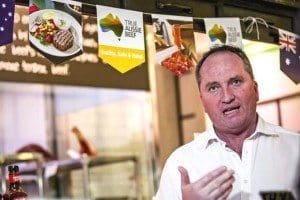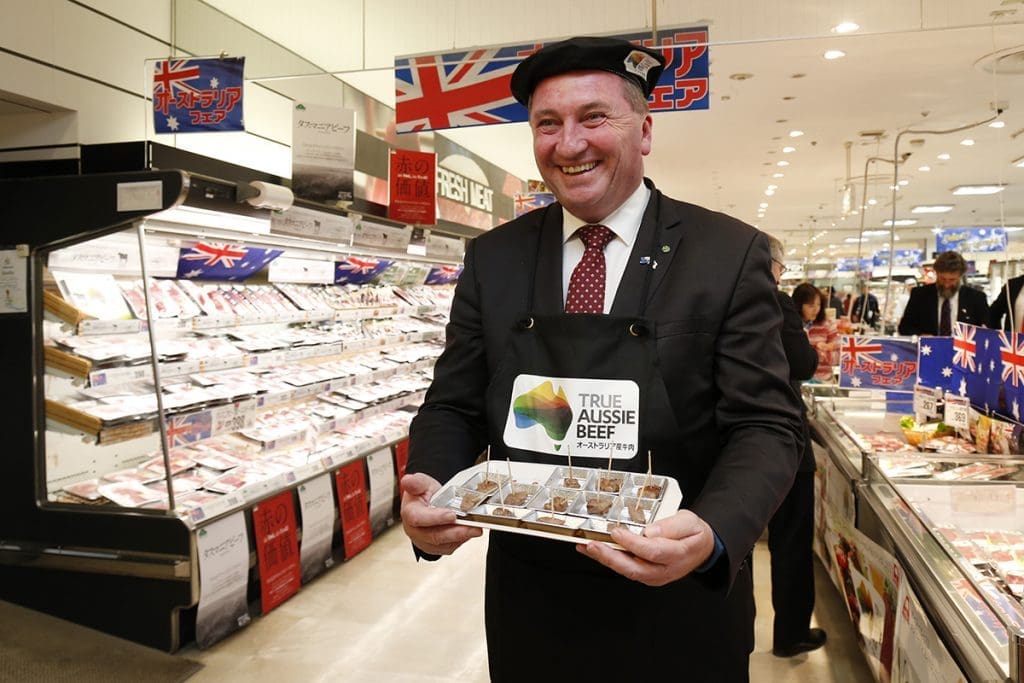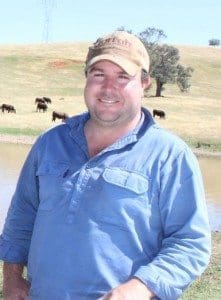AGRICULTURE minister Barnaby Joyce returns to Australia tomorrow after a five-day visit to China, Korea and Japan, where he has discussed the potential for future agricultural trade growth arising from Free Trade Agreements reached with North Asia’s three major economies.
 While in Japan over the weekend, he spoke to Japan’s Nikkei financial press about how Australia hopes to ramp-up exports of beef, dairy products and nuts to Japan under the newly-minted Trans-Pacific Partnership.
While in Japan over the weekend, he spoke to Japan’s Nikkei financial press about how Australia hopes to ramp-up exports of beef, dairy products and nuts to Japan under the newly-minted Trans-Pacific Partnership.
In his interview with Nikkei, Mr Joyce stressed that Australian products are complementary and “not a threat” to what Japanese farmers grow and raise.
Here’s Nikkei’s Q&A with Barnaby Joyce:
Q: How do you evaluate the TPP agreement?
A: “The TPP is vitally important for the economic liberalisation of our zone. Really, we see the future of the world, in economic terms, is in East Asia. Everybody wants to be a part of it, and the TPP brings the Americas closer into that mix as well.
Japan remains an incredibly strong trading partner of Australia, and Australia and Japan’s futures have been inextricably tied together with the development of Japan’s industrial basis on Australian coal and Australian iron ore. And now we see another strong connection between Australian agriculture being a niche market in Japan.
We don’t have any expectations whatsoever that we’ll be swamping Japan with food. We couldn’t even if we wanted to. But we’ll be a supplier of a quality product to a quality market. We want to make absolutely certain that Japanese farmers feel a sense that we’re all on this journey together and that … everybody gets a better chance of earning a bigger income.”
Q: What would you say specifically to Japanese farmers who fear the TPP and the competition it will bring?
A: “I would say that a lot of times people think Australia is a large sweeping plain of highly productive land. In reality, the vast majority of Australia is very dry and a lot of desert. What you see in Japan is … the overwhelming delivery of their food requirement domestically. What you see from Australia is such things as high-quality beef, high-quality rice, high-quality sugar being delivered into that market to assist in that food equation.
Australia feeds about 60 million people, currently, and even if we doubled our production, we would struggle to feed the Indonesian island of Java, alone. So the idea that we’ll swamp the world with agricultural product is just not correct. What we have to do is make sure that Japanese farmers clearly see us as a partner, not as a threat.”
Q: Australian beef could compete with cheap dairy cow meat in Japan, and Japanese Wagyu could compete with Australian Wagyu. So what is your strategy to sell Aussie beef to Japan and Asian markets?
A: “Our strategy is based on the consumer preference. Consumers will make their own decisions when they buy a product, but the big thing they see in Australia is a clean, green product — a product that they know is free of contaminants. As I always say to people: In beef, we are not the cheapest but we want to be one of the best. And the way we understand it, Wagyu beef from Japan is the top and it is an absolutely quality product. But there are a lot of people who can’t live on a diet of wagyu but they still want a good quality product, and Australia has the capacity to be part of that solution.
Wagyu is a very popular product, but it’s also much harder to grow than many other forms of beef, so it’ll always be a very expensive but minor part of the beef export equation. … It will have the capacity to assist in making sure that the volume is there so that we don’t have extraordinary increases in prices, because that’s no good to people on the street in Tokyo, or Osaka, or Sapporo. It’s just an assistance to keep the volume there so the price is affordable and we can keep a high-quality diet available for the people of Japan.”
Q: How would Australia compete with US beef in Japan?
A: “We’ll have a cost advantage to US beef, and in some instances a quality advantage. The US will always be a very strong exporter to Japan as well, and we will be working side-by-side in exports to Japan.
Australia has an advantage in that clean, green image. And we know that some countries such as the US have had problems in the past with diseases such as BSE.”
Q: The TPP lowered tariffs, but Australia still has biosecurity regulations that prevent Japanese beef from entering Australia. Do you see any movement on this front?
A: “We’re always reviewing our biosecurity requirements, but they’re based on science. Obviously with the hundreds and hundreds of millions of dollars we spend every year keeping Australia free of these diseases, we want to make sure we don’t compromise it.
We do import beef if it’s available from other areas which are free of diseases. The problem is that when it arrives in Australia, because we have so much beef, it’s hard to compete on price terms. But there are a lot of vegetable products coming into Australia now, a lot of areas where we’ve [traditionally] been a producer, such as grapes. Even when that product comes in, our consumption of the product hasn’t gone down, it’s actually gone up; it’s actually assisted us to keep our own producers producing in the counter-cyclical area. Because, as you know, when it’s winter in the northern hemisphere it’s summer in the southern hemisphere, and this also works well between our two countries.”
Q: Australia’s Prime Minister has expressed keenness toward economic ties with China, but what do you think about the recent wave of agricultural purchases in Australia by Chinese interests?
A: “We [the National Party] have called for, and got, a reduction in the foreign investment threshold limits so that there is a review on the purchases of agricultural properties when they cost more than $15 million from individuals and $55m for agribusinesses. But it’s not a ban, it’s a review. And it’s so that we feel that we have a better understanding of exactly who is buying what. We also have a Foreign Interests Register for agricultural land which we’re currently putting together.”
Q: So you’re going to keep this regulation as it is?
A: “Yes, that’s what we wish to do. Because an area around about two-and-a-half times the size of the state of Victoria, we believe, is now either totally foreign-owned or partially foreign-owned. And imagine how Japan would feel if they said, well, an area much larger than Honshu is foreign-owned in Japan; I imagine the Japanese would start asking some serious questions about foreign ownership.”
Q: Is there anything you’d like to review in the future under the TPP?
A: “I think on all agreements you need to continually review. But I think this one time we should just make what we’ve got work and settle in properly. We have a Japanese Free Trade Agreement, and we also have the TPP. And we want to make sure that both these agreements are well and truly in place and working well before we start saying, well, let’s take the next step.”
Producers represented on North Asian trade visit
Joining Ag Minister Barnaby Joyce on last week’s North Asian trade tour was Cattle Council of Australia independent director Marc Greening.
Travelling to China, Korea and Japan, Mr Greening is representing the beef industry alongside representatives from several other agricultural sectors including horticulture, dairy, grains and sugar.
“The primary goal of this agricultural delegation tour is to build on the relationships formed by the recent free trade agreements and strengthen the agricultural ties at both government and industry levels,” he said.
Mr Greening operates a Poll Hereford/Hereford Bull business supplying about 2500 grassfed cattle to various market channels including EU, PCAS domestic grassfed and other international destinations.
‘The Australian Beef Industry has erupted with international demand, especially in these markets (China, Japan, Korea) where demand is expected to rise by 6-7pc in the near future,” he said.





So did Japanese car manufacturers, white goods manufacturers, steel makers, electronics manufacturers see their Australian competition as “Partners rather than competition” when they let economic rationalism wipe out those industries in Australia? I don’t think so. International trade is economic warfare waged by one country against others and NO PRISONERS are taken! Get real Barnaby Joyce!
Readers are respectfully reminded that full names are required in comments submitted to Beef Central. Refer to our comment policy: https://www.beefcentral.com/beef-central-comment-policy/ – Editor